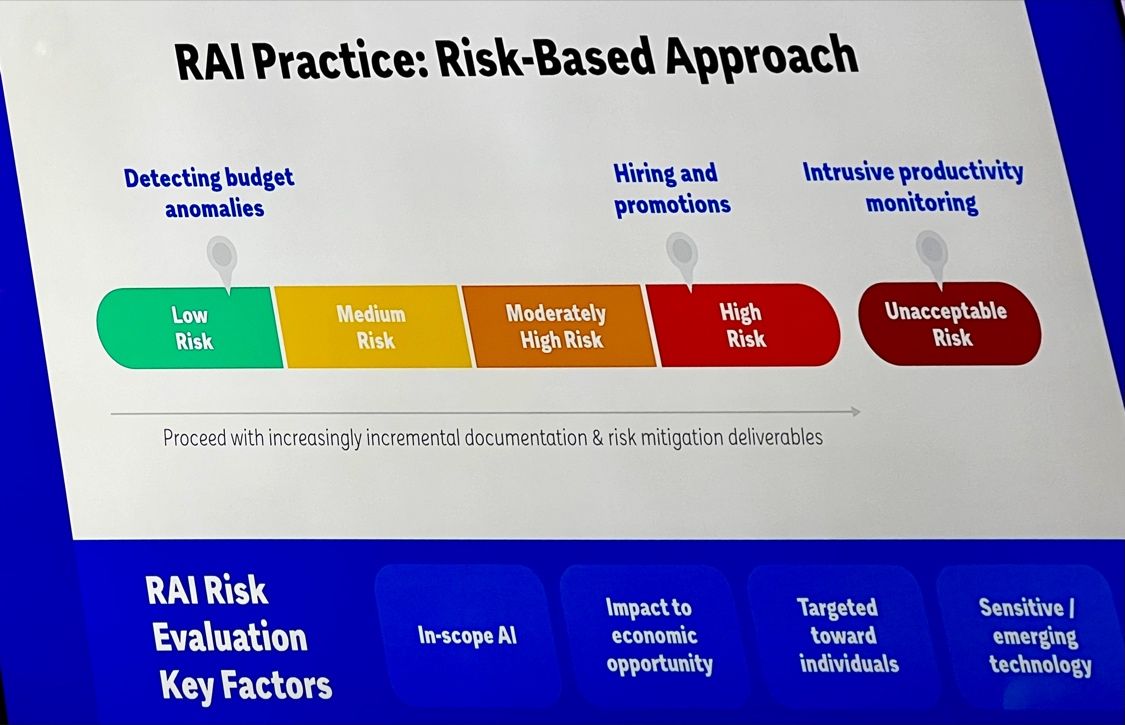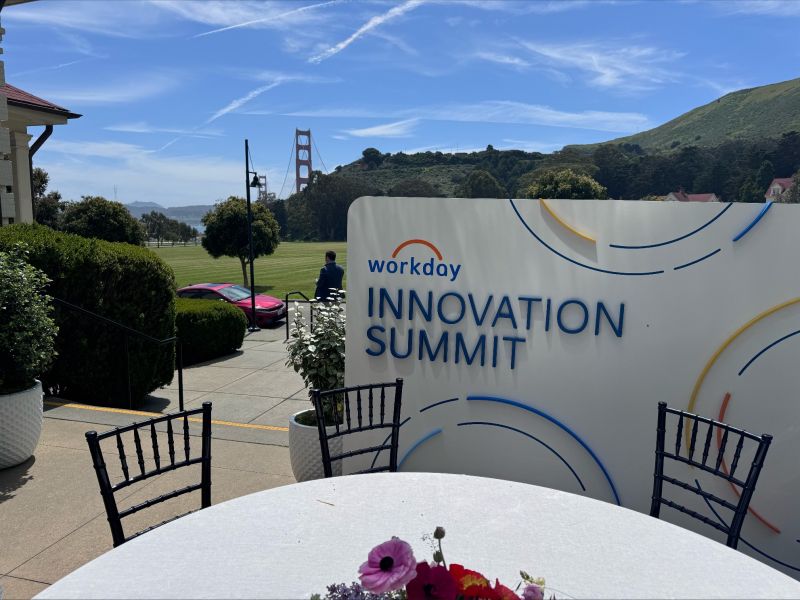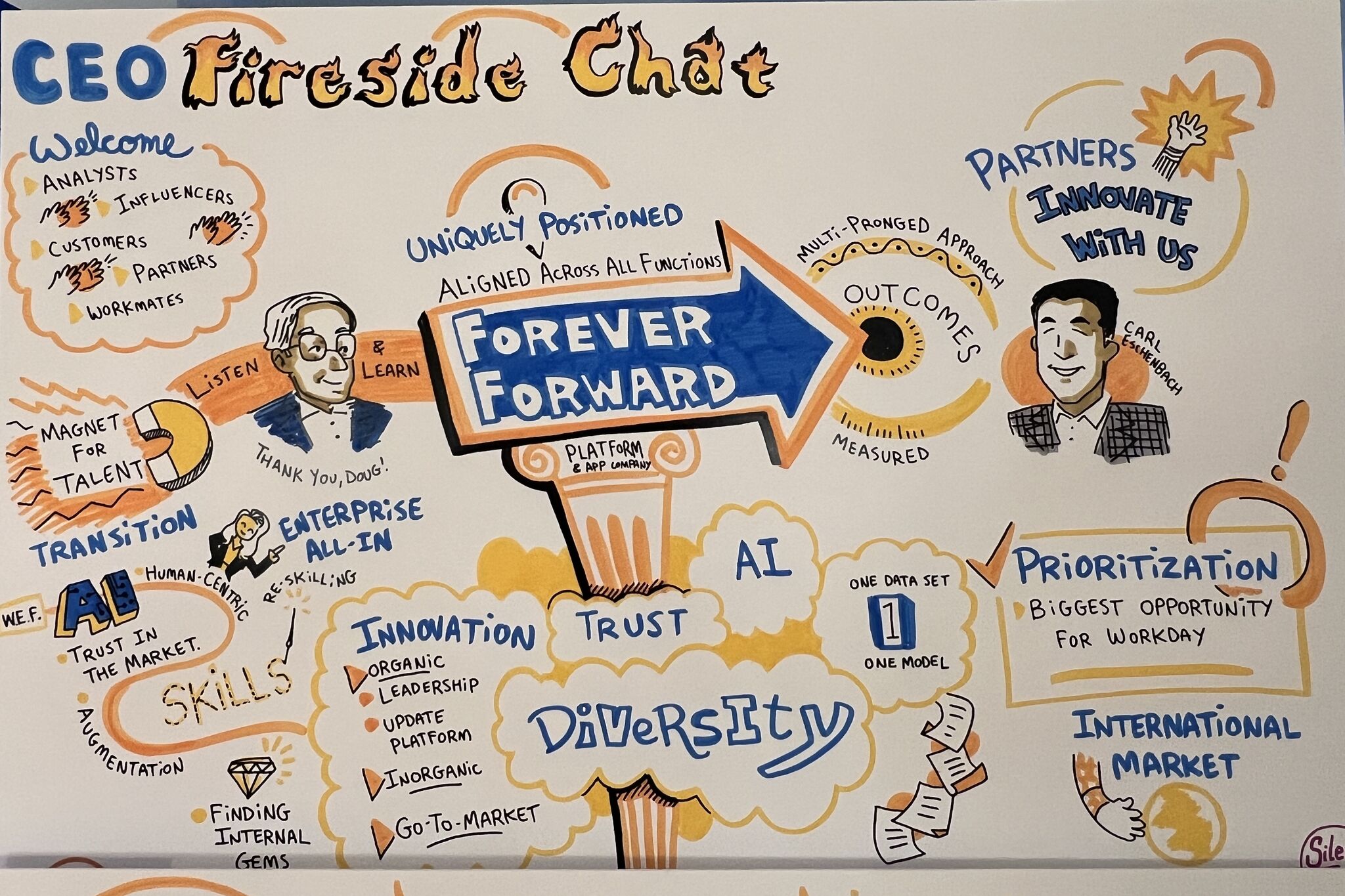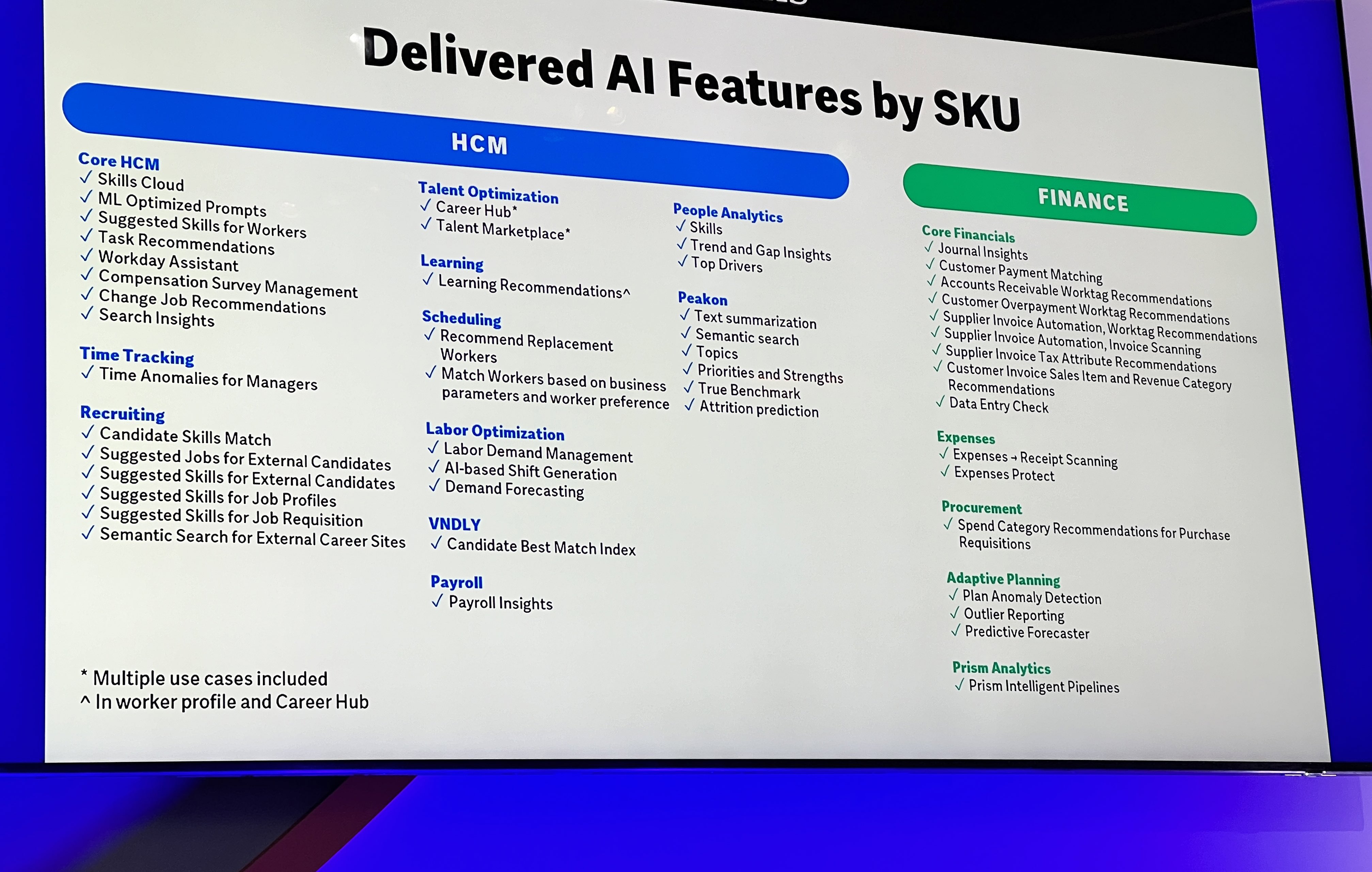People: Workmates New & Old
Under the guidance of Workday’s co-founder and Chairman, Aneel Bhusri, Carl Eschenbach was appointed as CEO in 2023. It was obvious that there’s a clear alignment in their shared values and the year-long transition has been seamless thus far. (Aneel joined the Summit on Day 2 and hasn’t lost any zeal for the business and continues to be involved as the Chairman of the Board. When asked about what he’d do differently in the past few years, his first comment was to “Hire Carl sooner.”) Carl sees possibilities in exponential growth for Workday and the areas which he’s most excited about are:
1. The $5T TAM and opportunity to grow the Financials business
2. International Markets and Global Expansion (particularly Japan)
3. Partner Ecosystem and unlocking new areas of growth by co-innovating with the platform strategy
Notably, there are also new appointments in key leadership roles, including Emma Chalwin, Chief Marketing Officer (CMO); David Somers Chief Product Officer (CPO) and Jim Stratton Chief Technology Officer (CTO). Doug Robinson, recently appointed as Co-President (and MC’ed the event) brings over 14 years of Workday experience into his new role and will oversee the sales and go-to-market efforts of the business. Athena Karp, CEO of Workday’s newly acquired HiredScore is now on board and will bring real expertise in the area of Talent Acquisition and Recruiting and AI. Leading the partner efforts, Matthew Brandt has assumed the role of SVP Global Partners after holding roles in Workday Financials and Healthcare sales. In his opening remarks, Carl highlighted the effective collaboration between seasoned veterans and fresh talent, emphasizing their integration into a unified “Workmates” team.
💡 Why are these changes to leadership important? Workday was built by a team of colleagues and leaders who had demonstrated exceptional synergy over numerous years, tracing back to the Peoplesoft era. However, as Workday enters its next phase of growth, these new appointments show promises to infuse fresh perspectives and help the business achieve their ambitious growth goals, while keeping true to the culture that Workday has been known for. From my point of view, the team had a visible synergy, openness and comradery and their messaging was cohesive throughout the 2 days.
Platform: “A More Open Workday” to unlock growth
In Carl’s early remarks, he said “Workday is moving from an Apps company to a Platform company”. Workday’s shift towards platform signifies a significant departure from its previous position as a closed, tightly controlled environment. Central to this is the new suite of user-friendly / no-code development tools, APIs (Workday Extend), and incentive programs (shared revenue model for partner apps) designed to attract software developers, new partners, and even customers to build on the application. By democratizing access to its platform and encouraging third-party participation, Workday seeks to catalyze innovation and accelerate the delivery of value-added solutions to its customers. As Matthew Brandt said, “Built on Workday” is going to be his new favorite phrase. Workday’s DevCon (to be held June 3-6th) will provide an early look at the AI Marketplace and the applications built by 15 early adopter partners.
Generative AI & Machine Learning (ML) was, of course, a big part of the discussion. Workday is set to release 50 new AI updates across recruiting, hiring, performance and skills, but while demonstrating some of the new opt-in features, they were careful to also talk about their ‘safe and responsible’ approach to AI.
“Nothing else matters if we can’t protect our customer data. Brand matters but we are protecting the data of 65 million people and their loved ones” – Josh DeFigueiredo, CISO.
Separation: Responsible AI & AI Development
Workday has established two distinct AI teams, one focusing on legal aspects with an emphasis on ethics (led by Chief Responsible AI Officer, Dr. Kelly Trindel), and the other concentrating on product and technology innovation. Additionally, a network of responsible AI champions is distributed throughout the organization, collaborating regularly to establish effective “guardrails.”

By the numbers:
Total Customers: 10,000 | Workday HCM: 5250 | Financials: 1900+ | Workday Extend: 6500+ developers, 900+ customers, 1600+ apps in production (85% ACV Growth)
Workday Skills: 2.1k customers | Workday ATS: 4k customers (36M job reqs / 284M applicants)
💡 Why are these platform and AI changes important?
Providing tools to build new applications on top of Workday provides customers with infinitely more options to grow the functionality of the product without having to buy and support 3rd party applications, and gives partners to build, market and monetize their applications through the Workday channel. Workday employs a global AI model customized with local preferences for each client (with each layer of the product having their own security structure). This architecture ensures that customers data is held more secure by allowing for an opt-in ability to utilize. While Workday is releasing many new AI features (both organically and through their acquisition of HiredScore), they are intentionally taking a more measured and controlled approach than their peers.
Partner Ecosystem: Rapid expansion with more to come
Matt Brandt, Workday’s Senior Vice President of Global Partners, outlined significant changes to the company’s partner ecosystem, signaling a strategic shift towards fostering collaboration and mutual growth. The overarching goal is to leverage partnerships and 3rd party software development as a distribution channel to tap into toward the goal of 17% growth. As someone who has been part of and actively following the partner channel closely for over a decade, this was the most significant shift I’ve seen from Workday. During his opening remarks, when asked about the ‘closed and controlled’ partner ecosystem that Workday has been known for, CEO, Carl Eschenbach made it clear that “…we are all in on partners and 100% open for business.” Last year Workday added 280 new partners, and surfaced 300 opportunities. In 2024, they aim to further leverage partner networks by implementing referral and co-sell programs, as well as expanding reseller programs. While these initiatives take time to develop, they are crucial for enhancing partner success.
“We are all-in on partners and 100% open for business.” – Carl Eschenbach, CEO
The partner model can be categorized in three key concepts: Build, Grow, and Deliver. Traditionally, discussions about partners have centered on System Integrator (SI) relationships, which have been instrumental in delivering successful implementations and services for Workday. However, with changes in platform and the ability for extensions and API builds now possible through Extend and new AI tools, as well as new deployment models (particularly suited for the mid-market), Workday sees partners as a new way to unlock revenue beyond deployments.
“Built on Workday” is my new favorite phrase. – Matthew Brandt, SVP, Partners
In terms of “Deliver,” Workday is prioritizing the customer experience while simultaneously expanding its partner ecosystem. The company is implementing programs to ensure quality standards are maintained as the partner network grows. This approach acknowledges the challenges posed by the laws of supply and demand, emphasizing the need for sustainable growth strategies.
💡 Why is Partner Ecosystem expansion important?
Expanding Workday’s partner ecosystem is vital for driving growth, innovation, and customer satisfaction, as Workday shifts towards a more open and inclusive approach to leverage partnerships for mutual success. At Raven Intelligence, we collect reviews about customer satisfaction and outcomes for partner and deployment work and the addition of more certified resources and options will be welcome and should help provide more supply for demand.
Final Comments
The transformation showcased by Workday at the Innovation Summit underscores its dedication to leading the Enterprise Software industry and fostering global expansion. Bolstered by fresh leadership, a proactive approach to platform application development, and an expanded partner network (Build, Sell, Deliver), Workday seems committed to prioritizing a superior customer experience and ethical AI practices. Positioned for further growth and sustained market leadership, Workday sets the stage for continued success in the industry.
Other Important Links:
LinkedIn posts about #WDAYSummit from other smart analysts
Introducing Accelerate with Workday (particularly of note for MidMarket customers)
Workday Marketplace / Coming Soon: Workday AI Marketplace





